- Home
- Jamie Fredric
Code Name Antares
Code Name Antares Read online
CODE NAME ANTARES
Grant Stevens
and
Team Alpha Tango
by
Jamie Fredric
This is a work of fiction. Names, characters, places, and incidents are the product of the author's imagination or are used fictionally. Any resemblance to actual events, locales, or persons, living or dead, is entirely coincidental.
Copyright © - 2013, Jamie Fredric
ALL RIGHTS RESERVED. This book contains material protected under International and Federal Copyright Laws and Treaties. Any unauthorized reprint or use of this material is prohibited. No part of this book may be reproduced or transmitted in any form or by any means, electronic or mechanical, including photocopying, recording, or by any information storage and retrieval system without express written permission from the author.
Other Books by Jamie Fredric:
Mission Critical
Black Ops 1
Warning Order
Black Ops 2
In the Mouth of the Wolf
Black Ops 3
Sacrifice of One
Black Ops 4
Last Op
Black Ops 5
Shanghai Mission
*
Visit: jfredric.blogspot.com
Dedication
For All Those Who Have Served
*
All Gave Some, Some Gave All
Team Alpha Tango
Home Base - “Eagle 8”
Grant Stevens - Captain, (Ret.); graduate U.S. Naval Academy; born in California; brown hair; brown eyes, 6’1”; fluent in Russian and Japanese; Code name “Panther”; Team call sign: “Yankee Zero-Niner”
Joe Adler - Lieutenant, (Ret.); born in Oklahoma; brown hair, blue eyes, 5’10”; fluent in German; Code name “Mustang”; “Yankee Two-Seven”
Frank Diaz - CPO; born in NY; black hair, brown eyes, 5’9”; EOD; fluent in Spanish, some Portuguese; “Yankee Three-Six”
Ken Slade - CPOS (Senior Chief), (Ret.); born in Alaska; bald; brown eyes; 5’10”; pointman/navigator; speaks the Inuit language, some Russian; “Yankee Four-One”
Cal “Doc” Stalley - Petty Officer 1st Class; born in Virginia; dark blond hair; blue eyes; 5’10”; corpsman; fluent in French, some Chinese; youngest of the Team; “Yankee Five-Two”
Darius “DJ” James - Petty Officer 1st Class; born in Florida; dark brown hair; brown eyes; 5’9”; communications; speaks some Turkish, Arabic; “Yankee Six-Eight”
Mike Novak - Petty Officer 1st Class; born in Wisconsin; dark blond hair; hazel eyes; 6’0”; sniper; speaks Hungarian and some German; “Yankee Seven-Three”
Matt Garrett - Captain, (Ret.); graduate of U.S. Naval Academy; born in Maryland; brown hair; brown eyes, 6’0”; fluent in French and German; “Yankee Eight-Four”
Chapter 1
March
Palmer Road
Maryland
Monday - Day 1
0015 Hours
Petty Officer Sam Franklin drove the gray Navy truck along dark, winding, two-lane Palmer Road. He rolled down the window a couple of inches, flicked out the butt of a Lucky Strike cigarette, then exhaled a lungful of smoke from the side of his mouth.
Rolling up the window, he shot a quick glance toward Lieutenant Paul Wayne. “Sure will be glad when this cold snap is over, sir. I’m ready for warm weather.”
Wayne had an M16 laying across his lap. Both he and Franklin had .45s holstered. “Can’t do much about it, Sam, just keep the heater turned up. Maybe you’d rather be riding with Sid and Tom back there,” he indicated with a thumb over his shoulder.
“No, sir. It’s just fine here.”
“That’s what I thought.”
“Say, lieutenant, do you have any idea what we’re hauling in those crates?”
“Sam, you ask the same damn question whenever we make a pick up at the factory. What’s my standard response?”
“Need to know, sir. We don’t have the need.”
Even with high beams on, Franklin failed to see a pothole and drove straight through it.
“Whoa! What the hell, Sam?!” Wayne shouted. A noise overhead diverted his attention. “Sounds like a chopper. You’re not breaking the speed limit, are you? Might be cops.”
Franklin glanced at the speedometer. “No, sir! Right on the money!”
Wayne rolled down the window and stuck his head out. Scanning the night sky, he finally spotted flashing navigation lights. “Yeah, it’s a chopper, but it looks like it’s moving on.” He rolled up the window, then pounded the back of his fist on the rear divider. “You men stay on alert back there!” He reached for the M16, chambered a round with the charging handle, then flipped the selector lever to safe.
As the truck went around a curve, its high beams landed on two men standing in the middle of the road. Franklin hit the brakes. The truck went into a skid, but he over-compensated, and the rear tire caught the thick edge of blacktop. The sound was ear-piercing as the truck’s undercarriage scraped across asphalt until the truck came to rest in a shallow ditch. Two guards in the bed were thrown around, their bodies rolling into the side of the truck.
Wayne’s rifle landed on the floorboard. He and Franklin both drew their sidearms, but it was too late. Bullets shattered both side windows, killing the two instantly. Two attackers, dressed in cammies, with black one-hole masks pulled over their heads, cautiously walked closer, continuing to aim the Uzis toward the cab.
The two guards in the bed regained their balance, and scrambled for their M16s, when out of nowhere, two more attackers rushed from the woods. Both guards fired. A bullet struck one of the oncoming men. He yelped in pain, grabbed his side, and collapsed, as the other man fell to the ground near him. Everything went quiet. Both guards were breathing heavy, listening for any sound of movement. Anything could’ve happened up front.
The two attackers at the front of the truck couldn’t take a chance and fire randomly into the bed, possibly damaging the “merchandise.” Drawing weapons from side holsters, they eased their way along the truck, one on either side.
“Lieutenant!” one guard shouted. Silence. “Sam!” He started to lean forward, when weapons fired, killing him and the other guard.
Three attackers walked closer, peering into the bed. Blood oozed from under both guards, mingling into one pool.
Immediately, two of the men jumped up into the truck bed. The crates were still secured, intact, undamaged. Slicing through the restraining ropes, they shoved the crates toward the tailgate.
The lead man called in the chopper, as he swiveled his head, looking for navigation lights. He signaled with a flashlight as the chopper came into view, flying from the west. A bright landing light flashed on, and they heard the distinct thump-thump sounds of a Huey’s rotors. Its skids touched blacktop no more than twenty-five feet from the truck.
Pulling one crate from the bed, the two men carried it to the chopper, while the injured man was helped into the cargo bay. Within a matter of minutes both crates had been loaded. The attackers hopped onboard, the rotors picked up speed, and skids lifted off the blacktop. The pilot set it on a southeast heading. Within minutes, its lights disappeared over the horizon, on its way to making the first delivery.
*
Bull Run Regional Park
Virginia
0500 Hours
A 1972 black Toyota pickup truck with a camper shell, was parked at the edge of a small clearing, facing toward a bumpy, narrow path, leading back to the main road.
The driver discovered this location months ago. He determined traffic entering and leaving the park during this time of year would be practically nil, and because of the time.
He was wearing nondescript clothes, all black: leather jacket,
pullover sweater, jeans and Converse sneakers. He glanced at the clock on the dash, then pulled a black one-hole mask down over his face. The chopper should be getting close. The pilot had been given instructions to circle within close proximity of the clearing until spotting his signal.
A faint sound of rotors at his three o’clock. Grabbing a flashlight from under the seat, he got out, lowered the tailgate, then walked toward the center of the clearing. Holding the flashlight overhead, he pressed the switch on and off. The dark, clear night made the light seem brighter, acting like a beacon.
In less than a minute, a Huey was hovering overhead. Cold air swirled around him, with dirt, leaves and small debris caught up in it. The chopper’s landing light came on as it began its decent.
He hustled back to the truck, started the engine, then backed up, getting it as close to the cargo bay as he could. There’d be no wasting time now. He jumped out of the cab and rushed toward the chopper. Three men stood in the cargo doorway.
He glanced at the wooden crate behind them, then noticed the injured man laying on the deck. Blood had soaked through his cammie jacket. “What happened?”
“Two of the guards opened up on us. Don’t worry. We took care . . .”
“Did you have any problem offloading?”
The man who called himself “Python” asked with a scoffing tone, “Are you kidding?! Do you know how many times we’ve hadda do this kinda fuckin’ shit?”
“I don’t give a damn, just hurry up and get that loaded.” When the crate was secured inside the truck, he pointed to the injured man. “See that he gets treatment. Since you’ve done this kinda fuckin’ shit before, you probably know of someone who won’t ask questions.” He reached inside his jacket, then lobbed a thick envelope to “Python.”
“That’s half of what we agreed on, as promised. I expect to get confirmation from the ship within a day. Then, I’ll contact you to arrange final payment.”
“Python” tossed the envelope up and down in his palm. “What are we supposed to do with the chopper?”
“Make sure it’s clean, then leave it at the airfield. I’ll take care of it from there. Now, go!” he shouted, pounding his fist against the side of the chopper.
The pilot checked his coordinates. The Huey slowly began its ascent then turned east and headed toward the coast again. But this time its destination was a small airfield just north of Rehoboth Beach, Delaware.
A couple of minutes later, before he reached the main road, the driver pulled onto the shoulder. Stripping off his mask, he tossed it on the floorboard, then reached under his seat. He grabbed a small black box, raised an antenna, and pressed the red button, setting a timer. Returning the box under his seat, he took a quick glance in his rear view mirror, seeing only darkness. There wasn’t any need for him to wait. He didn’t have any doubt the incident would be reported on the local news in the morning. He put the truck into gear and headed back to D.C.
*
The dead end side street he lived on had one flickering street light at the corner. He drove past the street, shut off the headlights, then turned left down the narrow alley, passing five homes. Each house had its own single car garage across the alley.
Driving just beyond his house at the end of the street, he put the truck in neutral, set the brake, then got out. As he walked to the garage, he glanced at the other houses, each one dark, quiet. His car was parked on the west side of the garage, in the shadows, less noticeable.
He unlocked the garage door, then slowly raised it. As soon as he backed the truck in, he immediately killed the engine. As an extra precaution, he locked it, and took one more look through the canopy window, ensuring the crate was still covered with the tarp.
As he unlocked the dead bolt on the wood-paneled house door, he glanced around one last time before going inside.
A yellowing shade on the single kitchen window was always lowered, even though he didn’t have too much concern about someone poking around outside. He knew every one of his neighbors, even if only by sight. He’d rented the small, furnished, two bedroom home five years ago, talking the landlord into leasing it on a month-to-month basis, after he paid a hefty deposit.
He dropped his keys on the counter, then hung his jacket on a nail by the door, before getting a can of ginger ale from the fridge. Sipping on his drink, he went into the living room, going directly to the front bay window. One house on the corner had a light on. His neighbor, Glen, was getting ready for his shift at the plant. Every other house was dark. He slowly drew the dark curtains together.
Sitting on an upholstered, high-backed chair by the window, he took a long drink, then leaned back. He focused his eyes on the opposite wall, not looking at anything in particular, but reviewing the evening’s events. It turned out precisely as planned. . . except for the killing of the Navy guards. But he had no control over the incident, and had to take the word of the men he’d hired. At least they managed to leave the scene before being discovered.
He rolled the cold can between his palms remembering the anticipation he experienced months ago when he, Nicolai Kalinin, was about to begin his mission in the United States.
*
He first saw the American at Dupont Circle Metro station. Located below Connecticut Avenue NW, the station’s north entrance escalators were 188 feet long. The station had two tracks, with two side platforms, and two entrances: one to the north on Q Street NW and one to the south on the southern edge of Dupont Circle. It was one of the busiest stations in D.C. and that was the reason the American chose it.
Misha Zelesky, assigned to the Russian Embassy, was to meet the American at 2000 hours near the bottom of the north escalator, where the hustle and bustle would keep attention away from them. As a means of recognition, Zelesky wore a black raincoat, black hat, and carried a brown leather briefcase. The American would be wearing a brown leather jacket, jeans, and a Baltimore Orioles orange baseball cap with black brim.
Zelesky usually picked up messages the American left at drop sites, and with a possibility the American had been watching, the decision was made. Zelesky would meet him.
Why the American decided on a face-to-face for delivering the instructions and not leave them at a drop site, was still unclear. Unless the instructions were of the utmost importance.
Maybe out of pure curiosity, and without the knowledge of his “handler,” Kalinin wanted an up close and personal look at this American, who for reasons yet unknown, had decided to become a traitor to his country. Arriving twenty minutes early, Kalinin positioned himself twenty feet away from the bottom of the escalator, trying to blend in with commuters.
For nearly fifteen minutes he waited for Zelesky to arrive, finally spotting him on the escalator, wearing the clothes agreed upon. Kalinin moved farther away, getting behind one of the route maps, keeping his eyes on the Russian.
Zelesky waited near the escalator, constantly looking at his watch. At 1955 hours, he spotted him coming down the escalator, wearing the Orioles baseball cap.
The American gave an almost imperceptible nod in his direction. A sound of an approaching train, and a sudden rush of wind being pushed ahead of it, didn’t draw their attention away from the task at hand.
Backing up, moving farther away from the tracks, both Zelesky and the American continued watching passengers hurrying closer to the edge of the platform as the sound of a train increased in intensity.
From his angle and from passengers constantly passing by, Kalinin wasn’t able to get a clear look at the American’s facial features, especially with the baseball cap pulled down to his eyes. All he noticed was a clean shaven face, hair cut very short, possibly dark brown or black, height just under 5’10”, weight about one sixty.
The American reached inside his jacket, took out a plain white envelope, and handed it to Zelesky. No words passed between the two men. And as passengers exited from the train, hurrying toward the “up” escalator, the American immediately walked away from Zelesky, mingling with the crowd.
He removed his baseball cap, and soon disappeared within a sea of people.
Zelesky slid the envelope into his pocket, waited until another train pulled into the station, then he left, heading for a specific drop site where Kalinin would pick it up.
It wasn’t until he returned home that Kalinin opened the envelope. The details on the paper inside were very specific. From those details, “Antares” set in motion his plan to steal top secret weapons from the U.S.
Chapter 2
December
Three Months Earlier
Residence of the Russian Ambassador
Washington, D.C.
1400 Hours
A spotless, black four-door Mercedes pulled into the U-shaped driveway at 1125 Sixteenth Street, NW. Parked behind a seven-foot high wrought iron fence lined with low bushes, its view of the street was unimpeded.
The driver got out and hurried around to the passenger side, opening the rear door. A stocky-framed man in his early sixties, stepped out, folding his dark gray coat over his arm. These colder days were much more reminiscent of his homeland. Russian Ambassador Anton Vazov glanced at gray clouds rolling across the sky. The local weather forecasted possible snow flurries.
As he walked toward the building, he reflected on the lunch he just finished at the Monocle. Only a half mile from the Capitol, the restaurant was a popular spot for all politicians. While Vazov didn’t have much hope in picking up the slightest tidbit of information, there was always a possibility. But it was the food that made him a regular patron. The flavors from today’s lunch still lingered on his tongue: a green salad topped with a mound of fresh crabmeat and a small sirloin steak, cooked rare, and for dessert, a slice of New York-style cheesecake.

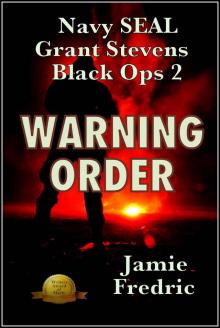 Warning Order
Warning Order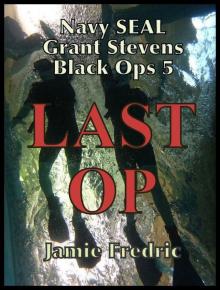 Last Op
Last Op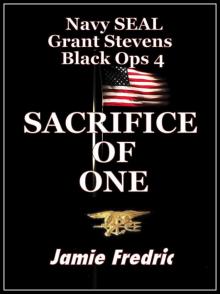 Sacrifice of One
Sacrifice of One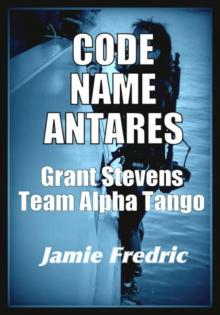 Code Name Antares
Code Name Antares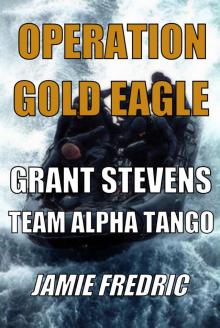 Operation Gold Eagle
Operation Gold Eagle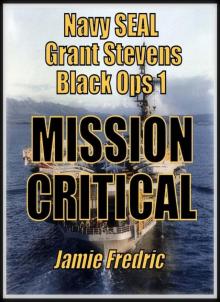 Mission Critical
Mission Critical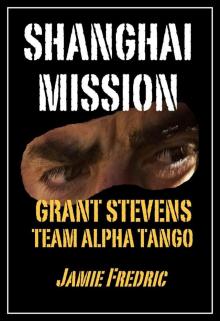 Shanghai Mission
Shanghai Mission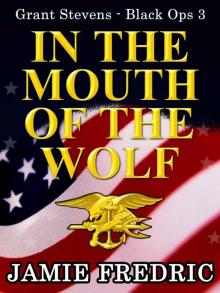 In the Mouth of the Wolf
In the Mouth of the Wolf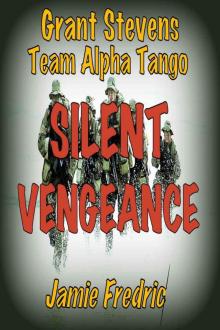 Silent Vengeance
Silent Vengeance